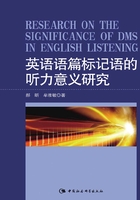
Chapter I Introduction
1.1 Background and Purpose
With the rise of discourse analysis,many linguists are showing great interest in the role that the discourse markers play in second language learning.Meanwhile,many of them(Schiffrin,1987;Fraser,1987&1990;Blakemore,1987 and Ran Yongping,2002,2003&2004)have devoted great efforts to the study of discourse markers.As is known,the study of discourse markers is one of the most important research areas in discourse analysis.Discourse markers are the words that indicate the logical connection among sentences and are generally at the beginning of a sentence to guide the main sentence or clause,and the words that show the attitude,intentions or tendencies of the authors or the speakers(Schiffrin,1987).Thus,through these markers,when understanding a discourse,we will be able to see what attitude,intention or inclination the authors wanted to express.The function of discourse markers is generally larger than that of their grammatical sense,so their great value not only lies in their grammatical role in the sentences,but also their semantic vicarious function in between the sentences,among the sentences and in the whole chapter(Fraser,1990).Discourse markers have been studied under different theoretical frameworks carried out for different purposes.Sperber and Wilson’s relevance theory,as well as Blake more’s cognitive-pragmatics perspective which is also based on the relevance theory provides a new view to study discourse markers.According to relevance theory,the hearer interprets every utterance in the smallest and most accessible context that yields adequate contextual effects for unjustifiable effort.Because of the wide range of the semantic function and relevance theory of discourse markers in the textual analysis and its great significance in English listening,it is a phenomenon that should be paid great attention to in the process of English listening comprehension.
Many linguists have done extensive research on the meaning,purpose,processes,strategies and skills of listening comprehension.Listening is an interactive process between the listener and the discourse and also a complex cognitive activity.In our country,listening comprehension has long been a major probleMfor EFL learners and news listening comprehension is considered bymany EFL learners the most difficult part.In the listening course,teachers usually lay emphasis on the teaching result instead of the process of listening comprehension.Actually,the comprehension process is of great significance in utterance interpretation.In recent years,many scholars have done a lot of research both in listening and discourse markers respectively,but few of theMlink the two.Many scholars abroad have done some researches on listening comprehension strategies,such as O’Malley and Chamot(1990)who made a division of listening strategies as follows:metacognitive strategy,cognitive strategy and social/affective strategy,Jane Willis(1996)who presented several listening strategies and Ellis(1994)who identified several characteristics to define language learning strategies.In China,the research on listening comprehension is mainly carried out under the frameworks of schema theory,top-down and bottom-up model,culture input perspective and so on.Only Zhu Yanran,He Mengyi and Wang Shuli conduct the research on listening comprehension based on the function of discourse markers,however,their studies are not done in detail.Moreover,none of theMhas laid emphasis on news listening.
As to discourse markers,the previous studies only focus on the effect of discourse markers on English reading,writing,speaking and other aspects,while their impact on the process of listening comprehension is ignored.According to Blakemore,the hearer will not only understand the propositional content of the message,but will expect to find further implications about the information in the given context.In order to achieve contextual implications,the speaker’s contextual assumptions interact with the hearer’s existing assumptions about the world.Discourse markers are linguistic cues that guide the hearer by constraining the number of possible interpretations(Blakemore,1992).This paper will illustrate some relevance theories of discourse markers,based on which we can understand the foundation of discourse markers.Moreover,mainly based on relevance theory,this paper attempts to explore the application of discourse markers in news listening comprehension and the role discourse markers play in English news listening.Therefore,this thesis is on the first attempt to find out today's college students’mastery of discourse marker and the extent of their awareness based on a questionnaire designed by the author.Then,itwill dig outwhat kind of relationship exists between news listening and discourse markers and to what extent the application of discourse markers affects the students in their accurate understanding,identifying and dealing with the message conveyed by the news.To do this,the author divided the subjects in this study into two groups--experimental group and controlled group.In the experimental group,the author carried out a training of using discourse markers to facilitate English news understanding in their English listening class for three months.In the controlled group,no training of the usage of discourse markers was given.The author also used pre-test and post-test to test the subjects’news listening level.Through a series of studies,involving the analysis of the results froMquestionnaire and tests,the author attempts to extensively seek the role of discourse markers in the news listening comprehension,in terms of its pragmatic functions based on relevance theory,in order to demonstrate and prove the usefulness of discourse markers in helping students to understand English news.